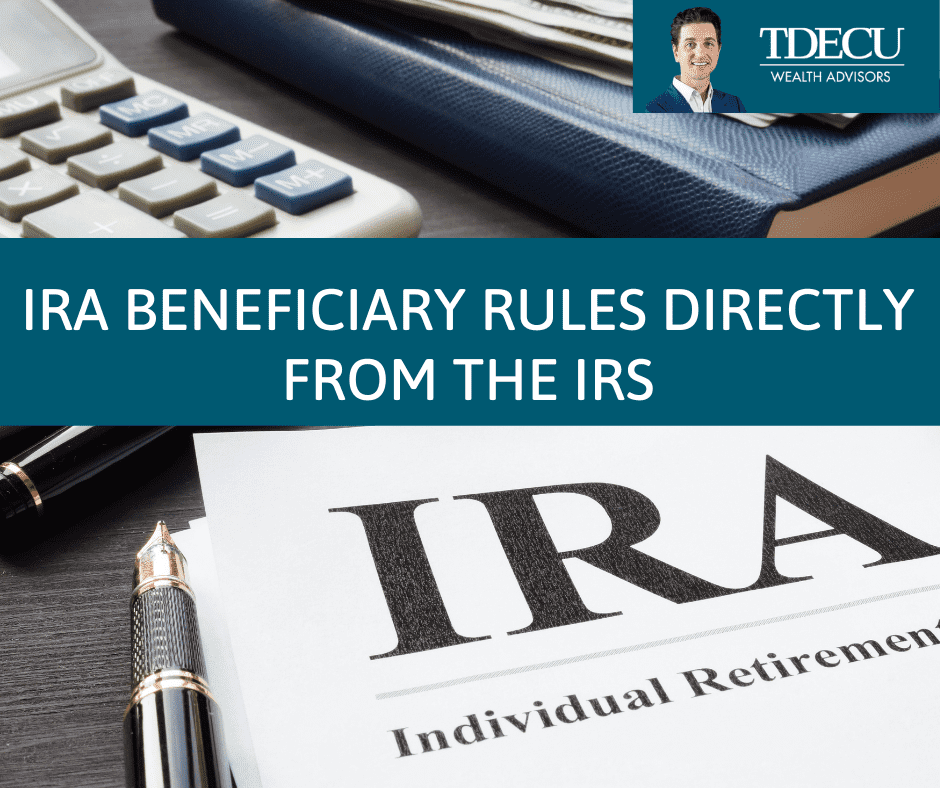As we get older, it is likely that we might inherit an IRA from mom or dad – or we need to counsel mom or dad as they inherit an IRA after one of them dies. The rules are different in each scenario and due to the passage of the SECURE Act, the rules have changed.
Thankfully, the Internal Revenue Service succinctly explains the choices one has on how to treat an inherited IRA. Here are the choices, copied (not summarized) directly from the IRS website:
“A beneficiary can be any person or entity the owner chooses to receive the benefits of a retirement account or an IRA after he or she dies. Beneficiaries of a retirement account or traditional IRA must include in their gross income any taxable distributions they receive.
IRA Beneficiaries
Inherited from spouse. If a traditional IRA is inherited from a spouse, the surviving spouse generally has the following three choices:
- Treat it as his or her own IRA by designating himself or herself as the account owner.
- Treat it as his or her own by rolling it over into a traditional IRA, or to the extent it is taxable, into
- Qualified employer plan,
- Qualified employee annuity plan (section 403(a) plan),
- Tax-sheltered annuity plan (section 403(b) plan),
- Deferred compensation plan of a state or local government (section 457(b) plan), or
- Treat himself or herself as the beneficiary rather than treating the IRA as his or her own.
If a surviving spouse receives a distribution from his or her deceased spouse's IRA, it can be rolled over into an IRA of the surviving spouse within the 60-day time limit, as long as the distribution is not a required distribution, even if the surviving spouse is not the sole beneficiary of his or her deceased spouse's IRA.
Inherited from someone other than spouse. If the inherited traditional IRA is from anyone other than a deceased spouse, the beneficiary cannot treat it as his or her own. This means that the beneficiary cannot make any contributions to the IRA or roll over any amounts into or out of the inherited IRA. However, the beneficiary can make a trustee-to-trustee transfer as long as the IRA into which amounts are being moved is set up and maintained in the name of the deceased IRA owner for the benefit of the beneficiary.
Like the original owner, the beneficiary generally will not owe tax on the assets in the IRA until he or she receives distributions from it.
Generally, the entire interest in a Roth IRA must be distributed by the end of the fifth calendar year after the year of the owner's death unless the interest is payable to a designated beneficiary over the life or life expectancy of the designated beneficiary.
If paid as an annuity, the entire interest must be payable over a period not greater than the designated beneficiary's life expectancy and distributions must begin before the end of the calendar year following the year of death. Distributions from another Roth IRA cannot be substituted for these distributions unless the other Roth IRA was inherited from the same decedent.
If the sole beneficiary is the spouse, he or she can either delay distributions until the decedent would have reached age 70½ or treat the Roth IRA as his or her own.
Beneficiaries of Qualified Plans
Generally, a beneficiary reports pension or annuity income in the same way the plan participant would have reported it. However, some special rules apply.
A beneficiary of an employee who was covered by a retirement plan can exclude from income a portion of nonperiodic distributions received that totally relieve the payer from the obligation to pay an annuity. The amount that the beneficiary can exclude is equal to the deceased employee's investment in the contract (cost).
If the beneficiary is entitled to receive a survivor annuity on the death of an employee, the beneficiary can exclude part of each annuity payment as a tax-free recovery of the employee's investment in the contract. The beneficiary must figure the tax-free part of each payment using the method that applies as if he or she were the employee.
Benefits paid to a survivor under a joint and survivor annuity must be included in the surviving spouse’s gross income in the same way the retiree would have included them in gross income.”
What Should You Do?
Consulting your financial professional for guidance, especially to confirm that the decisions you make are consistent with your overall financial plan, is a good idea.
Wes Garner, CRPC
Principal Wealth Strategist
(281) 269-8669
wgarner@tdecu.org

Important Disclosures
All information is believed to be from reliable sources; however LPL Financial makes no representation as to its completeness or accuracy.
The opinions voiced in this material are for general information only and are not intended to provide specific advice or recommendations for any individual security. To determine which investment(s) may be appropriate for you, consult your financial professional prior to investing.
This information is not intended to be a substitute for specific individualized tax advice. We suggest that you discuss your specific tax issues with a qualified tax advisor.
Contributions to a traditional IRA may be tax deductible in the contribution year, with current income tax due at withdrawal. Withdrawals prior to age 59 ½ may result in a 10% IRS penalty tax in addition to current income tax.
The Roth IRA offers tax deferral on any earnings in the account. Withdrawals from the account may be tax free, as long as they are considered qualified. Limitations and restrictions may apply. Withdrawals prior to age 59 ½ or prior to the account being opened for 5 years, whichever is later, may result in a 10% IRS penalty tax. Future tax laws can change at any time and may impact the benefits of Roth IRAs. Their tax treatment may change.
This article was prepared by FMeX.
Tracking # 1-05110284
